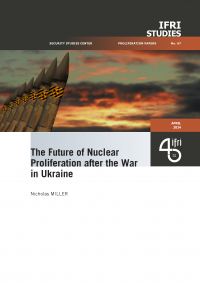
The Future of Nuclear Proliferation after the War in Ukraine Proliferation Papers, No.67, April 2024
In the context of deep changes to the international security environment, especially the war in Ukraine, the risks of nuclear proliferation seem quite high, especially in the Middle East and East Asia.

Four categories of factors have been identified that might trigger an escalation. Firstly, changes in the international security environment, including heightened competition among major powers, could increase pressure for proliferation in regions like Europe, Asia, and the Middle East. Secondly, the declining ability of the United States to enforce non-proliferation regimes may lead allies to seek nuclear capabilities due to concerns over U.S. reliability. Thirdly, failures by nuclear powers to uphold disarmament commitments and the emergence of the Treaty on the Prohibition of Nuclear Weapons could undermine non-proliferation norms. Lastly, the war in Ukraine highlights the potential use of nuclear threats in conflicts, reinforcing the perception of nuclear weapons as crucial for national security.
While there are reasons to anticipate growing proliferation risks, historical precedent suggests that these risks can be managed. Concerns over U.S. reliability and disarmament failures have been addressed through coercion and reassurance in the past. Additionally, the impact of conventional wars supported by nuclear deterrence has been contained. While some risk factors are novel, such as the decline of the U.S. nuclear industry and the emergence of the Treaty on the Prohibition of Nuclear Weapons, their decisive impact remains uncertain.
The implications for the Middle East and East Asia vary. Allies like Japan and South Korea may be convinced to remain non-nuclear due to U.S. security assurances, while adversaries like Iran could be incentivized to pursue nuclear capabilities amid declining effectiveness of U.S. sanctions. If Iran acquires nuclear weapons, it may pressure Saudi Arabia to follow suit, potentially leading to regional proliferation dynamics. Thus, great powers and the international community need to step in to manage proliferation triggers by maintaining a focus on nonproliferation in their statecraft.


